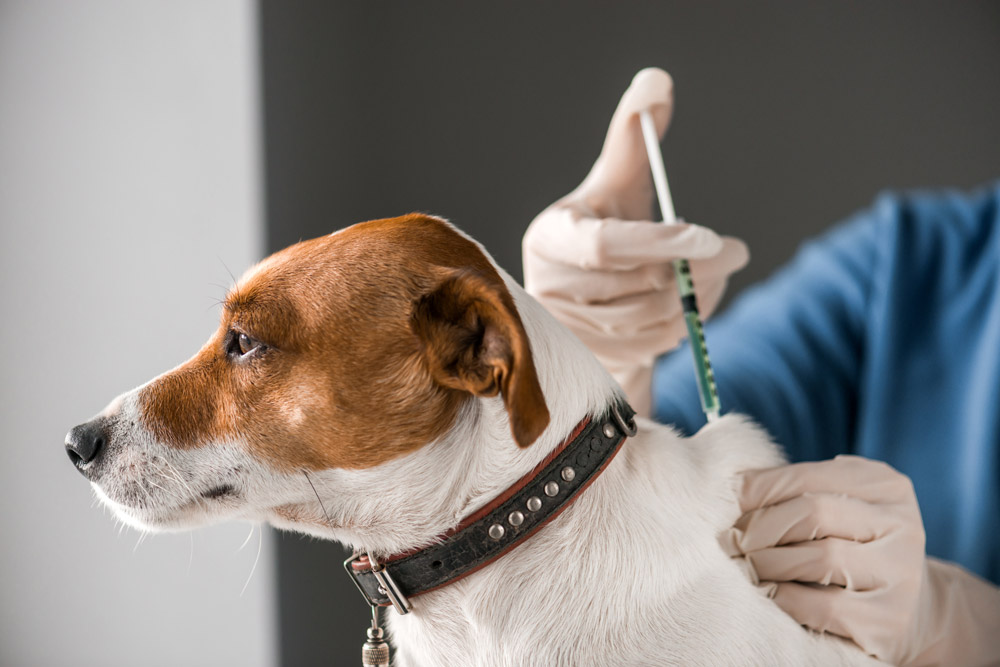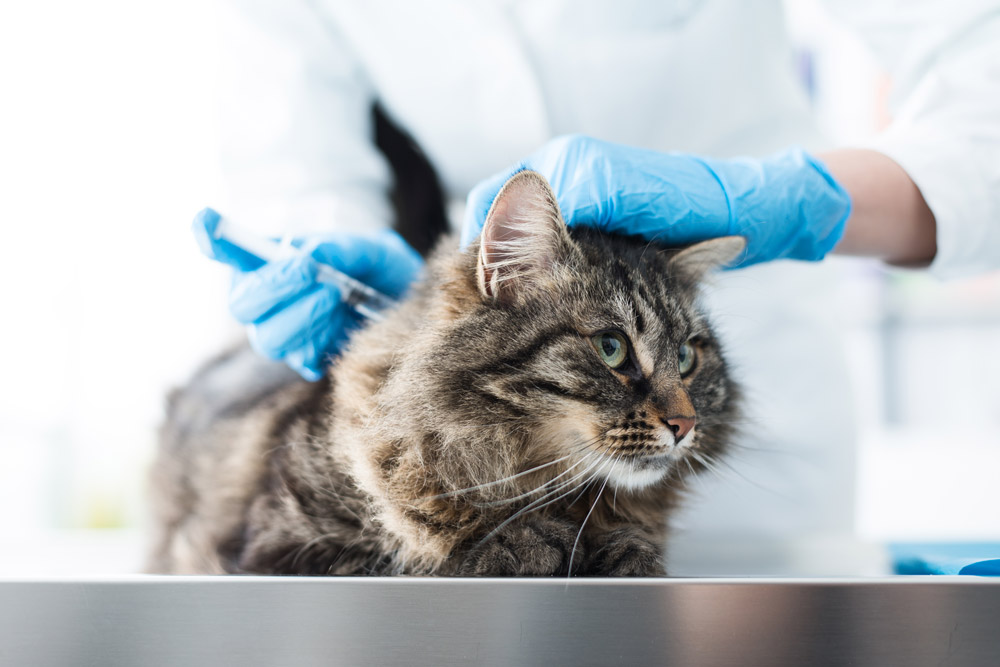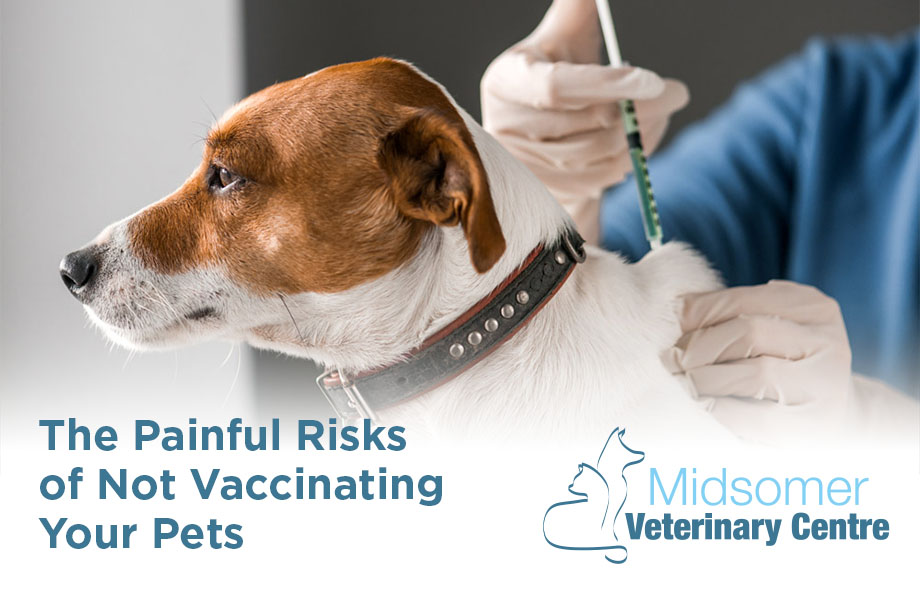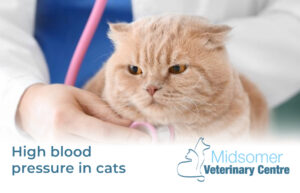Diseases that you pet can be vaccinated against can have devastating effects. For most of the viruses that affect pets today there is still no treatment other than treating symptoms, so prevention is the only route to prevent suffering and – potentially – death. Exposure to infection isn’t just a random encounter with an unfortunate infected pet either – some diseases such as canine parvovirus can live in the environment for up to nine months, and some can even be transferred to humans.
Providing the parents have been vaccinated, puppies and kittens are usually born with natural protection from infections. The immunity is passed on through the mother’s milk and lasts for a few weeks, but after that, their immature immune system is open to infection unless vaccinated.
A vaccine is designed to stimulate your pet’s immune system by brief exposure to the disease. Their immune system will then have a faster and stronger reaction to the disease as it has a ‘memory’ of it, and they can then successfully beat the disease and get it out of their system.
Currently, we recommend yearly boosters for many of these diseases to ensure that your pet’s immune system is always vigilant and prepared for disease. As well as having this annual ‘booster’ vaccination, they will also have a thorough clinical examination that can alert us to problems ranging from bad teeth to heart disease.

Diseases we vaccinate your dog against are:
Canine parvovirus
This is often a fatal disease and causes severe diarrhoea and vomiting. Dogs become severely dehydrated, and their immune system is damaged so that they can’t fight infection. It is a very tough virus and even standard disinfectants can’t kill it once it’s in the environment.
Canine distemper virus
This is another nasty disease that causes vomiting, diarrhoea, pneumonia, brain disease and death. Fortunately, vaccination means that this is no longer a common disease and we need to keep it that way.
Leptospirosis
This infectious bacterial disease is generally caught by dogs drinking water exposed to rat urine, and can be passed on to humans. The bacteria spread through the body via the bloodstream. The disease can cause severe damage to the liver and kidneys and can be fatal.
Younger animals with less developed immune systems usually suffer the most severe complications, and it is often children who are most at risk of contracting the disease from an infected pet.
Infectious canine hepatitis ICH
This acute infection (which can’t be transmitted to us) can cause severe damage to the liver and kidneys and is often fatal. It is caught through faeces and bodily fluids from an infected animal, and then travels through the mucous membrane in the nose and mouth before growing in the tonsils. The infection then travels to the liver and kidneys. Treatment is symptomatic, which means there’s no cure and therefore vaccination defence is essential.
Parainfluenza
This is a viral infection that is often spread around dogs living in close proximity or where many dogs often visit. It can be spread by a variety of means including coughing and sneezing, but also on shared bedding, bowls and toys etc. the symptoms are generally flu like, and dogs will often develop a dry persistent cough. The prognosis for infected dogs depends on varying factors such as age and general condition, and whether damage from the disease causes any secondary conditions.
Kennel Cough
If your dog will be spending some time in kennels they may also be given a kennel cough vaccine. This vaccine is usually given intra-nasally (into a nostril) and – alongside the parainfluenza vaccine – protects against flu and kennel cough.

Diseases we vaccinate your cat against are:
Feline infectious enteritis
This is caused by infection by something called feline parvovirus (FPV), which is also sometimes known as feline panleukopenia as it results in a low white blood cell count. It’s one of the biggest disease dangers to cats, and is often very quickly fatal. This disease can live in the environment for years, and can’t be killed by disinfectant so vaccination is ESSENTIAL.
Feline flu (feline herpes virus and feline calicivirus)
These two vaccines are given together as between them they make up the upper respiratory tract disease known as feline flu. There are no antiviral drugs to treat this disease, and it can cause serious damage and in some cases be fatal – especially in kittens and in those with underlying medical conditions. Even mild cases can result in permanent damage to the cat’s eyes, and often blindness.
Feline leukaemia virus
This is an incurable viral disease that is often fatal. It can be very hard to detect initially as symptoms can be vague and mild, then as the year’s progress there are more serious consequences as white blood cells are damaged.
The immune system is compromised and infected cats are much less able to fight off common conditions. Frequent infections are common as is weight loss, fever, lethargy, and diarrhoea. Anaemia is also common, and cats become lethargic, weak and have a pale tongue and gums. Cancers of the white blood cells often develop and a fifth of cats with the feline leukaemia virus die from cancer if they haven’t already died of symptoms or of one of the many infections they pick up.
Pets travelling abroad may require additional vaccination, and you will need to discuss any travel plans with your vet well in advance.


